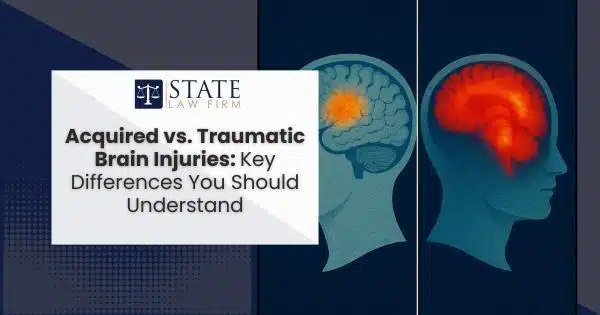Brain injuries can reshape a person’s life in an instant — or develop quietly over time, often going unnoticed until significant damage has occurred. In the United States alone, approximately 1.5 million people suffer from a traumatic brain injury (TBI) each year, with thousands more affected by acquired brain injuries (ABIs) stemming from strokes, infections, or tumors (Brain Injury Association of America).
At State Law Firm, our mission is to stand beside individuals and families navigating these complex medical and legal challenges. As a boutique personal injury practice in Sherman Oaks, our young attorneys are dedicated to helping clients secure the support they deserve, whether the injury resulted from a serious car accident or a preventable medical condition.
In this guide, we break down the essentials:
- What defines an acquired brain injury versus a traumatic brain injury
- Common causes and warning signs to watch for
- The key differences in recovery and long-term outlook
- Effective treatment paths and why early intervention is critical
Understanding the nuances of brain injuries empowers victims and their loved ones to advocate for proper care and fair compensation. If you or someone you love is struggling with the long-term effects of a traumatic brain injury, you’re not alone — and we’re here to help guide you forward.
Let’s explore what sets these two types of brain injuries apart and what steps you can take to protect your health and legal rights.
Understanding Brain Injuries: An Overview of Acquired and Traumatic Types
Brain injuries fall into two broad categories: acquired brain injuries (ABIs) and traumatic brain injuries (TBIs). Both can cause significant disruption to a person’s daily life, but they differ in how and when the damage occurs.
- Acquired brain injuries develop after birth and are typically caused by medical conditions such as strokes, infections, or tumors.
- Traumatic brain injuries, on the other hand, result from external force, like a blow to the head during a fall, a car accident, or a sports incident.
Regardless of how they occur, both ABIs and TBIs can lead to serious neurological injuries that affect memory, speech, mobility, and emotional well-being. At State Law Firm, understanding these differences is the first step toward getting the care and compensation you deserve.
What Are Acquired Brain Injuries? Causes and Effects Explained
An acquired brain injury happens when a medical condition disrupts normal brain function. Common causes include:
- Stroke: A blockage or bleed that cuts off oxygen to brain tissue.
- Brain tumors: Abnormal growths that compress or damage healthy brain cells.
- Infections: Conditions like meningitis or encephalitis that inflame brain tissue.
- Lack of oxygen: Near-drowning, cardiac arrest, or suffocation incidents can deprive the brain of oxygen.
Effects of ABIs can range from mild memory problems to severe cognitive and physical disabilities. Many patients need ongoing rehabilitation to regain independence.
Pro Tip: If you or a loved one has a known medical condition that could impact brain function, regular check-ups and early intervention can make a world of difference.
The Nature of Traumatic Brain Injuries: Common Causes and Symptoms
Traumatic brain injuries (TBIs) occur suddenly and are usually caused by an external impact or jolt. Leading causes include:
- Motor vehicle accidents: A significant source of TBIs nationwide — and a focus of our car accident representation.
- Falls: Hazardous for young children and older adults.
- Sports injuries: Contact sports, such as football and boxing, increase the risk.
- Violence: Assaults and domestic abuse can result in severe head trauma.
Common TBI symptoms can appear immediately or develop over days:
- Headaches
- Confusion or loss of consciousness
- Nausea and vomiting
- Difficulty speaking or remembering
- Personality or mood changes
Even mild TBIs, such as concussions, deserve medical attention. Ignoring signs can lead to long-term complications that impact every aspect of life.
Key Differences Between Acquired and Traumatic Brain Injuries: A Comprehensive Comparison
While both ABIs and TBIs affect the brain’s structure and function, they differ in several key ways:
| Aspect | Acquired Brain Injury (ABI) | Traumatic Brain Injury (TBI) |
| Cause | Medical condition (e.g., stroke, tumor) | External force (e.g., accident, blow) |
| Onset | Can develop gradually | Sudden and immediate |
| Damage pattern | May affect specific regions or the whole brain due to oxygen loss or disease | Often localized to the impact site, but can cause widespread swelling |
| Recovery | Depends on the underlying cause and severity | Highly variable — mild TBIs may heal quickly, severe cases require long-term care |
| Legal considerations | Complex if medical malpractice or negligence is involved | Often involves liability claims for accidents, assaults, or unsafe premises |
Understanding these distinctions helps victims and families plan treatment and consider legal options for securing necessary support.
Treatment Options for Acquired vs. Traumatic Brain Injuries: What You Need to Know
Recovering from a brain injury can be a long journey, but the right treatment plan makes all the difference.
For ABIs, treatment usually focuses on addressing the underlying condition:
- Medications for infections or tumors
- Surgery to remove masses or relieve pressure
- Stroke rehabilitation programs
For TBIs, immediate medical care is critical:
- Emergency surgery in severe cases
- Hospital monitoring for swelling or bleeding
- Physical, occupational, and speech therapy for long-term recovery
Pro Tip: Following all medical advice and attending therapy consistently can significantly improve outcomes. If your brain injury resulted from someone else’s negligence, getting legal advice early can help cover expensive treatments.
The Importance of Early Diagnosis and Intervention in Both Conditions
Timely diagnosis can change everything for brain injury survivors. Quick medical intervention can:
- Limit the extent of damage
- Prevent complications like swelling or infection.
- Improve chances of a full or partial recovery
- Support a smoother reintegration into daily life
Don’t wait: If you notice sudden confusion, headaches after an impact, or any signs of neurological changes, seek immediate medical help. Afterward, speaking with a legal team, like our dedicated attorneys at State Law Firm, ensures that you have an advocate to fight for compensation for medical bills, therapy, lost income, and future care needs.
Final Thoughts
Brain injuries are complex, but understanding their causes, effects, and treatment options can help you make informed choices for yourself or a loved one. Whether your injury was caused by an unexpected medical condition or a sudden accident, know that State Law Firm is ready to stand by your side and pursue every avenue for recovery and justice.
If you’re facing the lasting impacts of a brain injury, explore our guide on the long-term effects of TBIs and reach out to learn how we can help you move forward with confidence.


